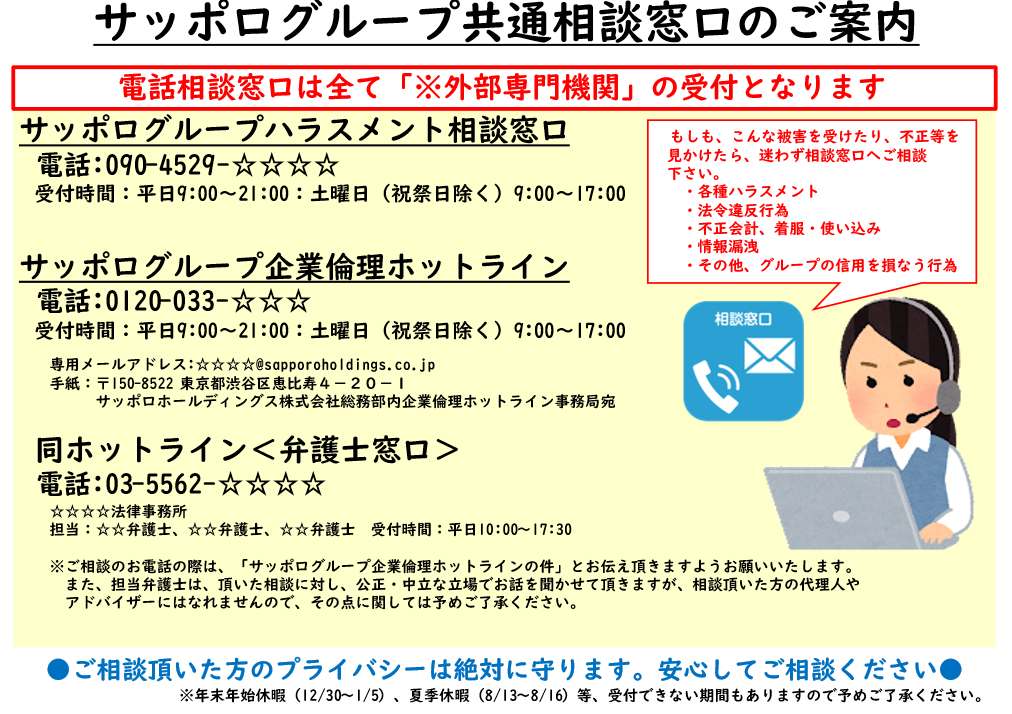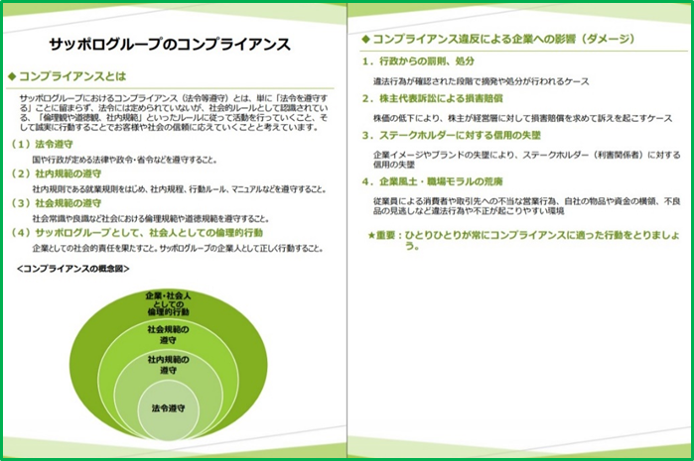Promoting Compliance
Basic Approach
- The Sapporo Group Code of Business Conduct provides a set of guidelines for sound ethical behavior applicable to all officers and employees. The Board of Directors supervises the application of the Code, and resolves and determines its enactment and revisions (except for minor revisions).
- Sapporo Holdings has established a Group Risk Management (GRM) Committee, chaired by the President, which is responsible for risk management of the entire Group. In normal times, the committee reviews the status of risk responses of the Group as a whole and has established a system that enables immediate decision-making in crisis time.
- The Sapporo Group Whistle-Blower’s Hotline and Helpline was established to help prevent, or quickly detect, misconduct within the Group. And as an internal auditing organization independent of executive reporting lines, the Group Audit Department audits general business operations of Sapporo Holdings and its subsidiaries to verify compliance with laws and regulations, articles of incorporation and company rules.
Structures and Organizations for Raising Awareness of and Promoting Compliance
Sapporo Holdings’ Group Risk Management (GRM) Committee promotes compliance across the entire Group. Each Group company designates a department responsible for promoting compliance, which advances activities within the company accordingly.
Approach to Specific Initiatives
Communicating the Sapporo Group Code of Business Conduct
- Applicable to all employees working throughout the Group, the Sapporo Group Code of Business Conduct is communicated in-house via each company’s intranet and the "Sapporo Minibook".
- Compliance e-learning programs for all Group employees and workplace study groups organized at individual Group companies are some of the ways employees gain knowledge of and familiarity with details of the Sapporo Group Code of Business Conduct.
Communicating Basic Policy and Rules of the Sapporo Group and Individual Group Companies
The Sapporo Group has established various basic policies, including the Sapporo Group Management Philosophy and Fundamental Management Philosophy, as well as various rules and regulations. These basic policies, rules and regulations, in the same manner as the Sapporo Group Code of Business Conduct, are communicated to all employees by posting them on the company intranet and in the "Sapporo Minibook".
In particular, regarding Basic Policy Relating to Systems for Excluding Anti-social Forces, Sapporo Group Rules for Preventing Insider Trading, and Policy on Anti-Corruption, etc., which were established to ensure compliance with important laws and regulations, we conduct compliance e-learning, workplace study sessions, and other programs for all Group employees so that they can understand and become familiar with the contents of such policies.
Surveys, Research and In-house Education Relating to Laws and Regulations
- In regard to laws and regulations relevant to company operation and execution of business affairs, each company of the Sapporo Group works to ensure those laws and regulations are properly observed by clarifying which laws and regulations departments have responsibility for and conducting surveys and research. Systems for obtaining information on revisions to laws and regulations in a timely manner are effectively used.
- Departments with responsibility for laws and regulations convey information, particularly relating to important laws and regulations, to concerned company personnel using appropriate means.
Internal Reporting System
In 2003, Sapporo Holdings formulated the Sapporo Group Corporate Ethics Hotline Regulations, with the goal of preventing or detecting at an early stage corruption such as misconduct and bribery within the Group, and contributing to the sound development of the Group by nurturing high ethical standards within employees.
The regulations require people to report any misconduct they learn about, and as measures for preventing any disadvantage to whistleblowers, they stipulate that "information that can identify the whistleblower, such as his or her name, shall not be leaked without the whistleblower's consent, and the privacy of the whistleblower shall be protected" and that "if the secretariat confirms that a whistleblower has been subjected to disadvantageous treatment or retaliation, the secretariat shall order the company or the violator to immediately stop the act.”
They also stipulate the mechanism for factual investigations and the actions to be taken against people who have violated the regulations.
The regulations cover all persons working at Group companies who are whistleblowers, including employees of the companies’ business partners and subcontractors.
In accordance with these regulations, the General Affairs Department in its role as secretariat has established the "Sapporo Group Corporate Ethics Hotline," which has multiple contact points for whistleblowing, including external specialized institutions and lawyers, and enables anonymous consultation and whistleblowing, operations and works to raise awareness of the Hotline.
In addition, an inquiry desk has been set up separately on the Company's website and is available for stakeholders including customers.
Any reports that point to serious misconduct are swiftly communicated to the secretariat to the GRM Committee. If instructed by the committee chairperson or acting chairperson, the secretariat to the GRM Committee then carries out any necessary investigations on behalf of the GRM Committee. If it is ascertained that misconduct has taken place, or is about to take place, the company concerned or the person performing the misconduct are ordered to cease the conduct.
Consultation about harassment matters is available, too, via a separately established Sapporo Group Harassment Consultation Desk.
Besides the above two contacts for the whole Group, POKKA SAPPORO Food & Beverage and Sapporo Lion have established corporate ethics consultation desks, while Sapporo Breweries and Sapporo Real Estate have set up harassment consultation desks.

Policy on Anti-Corruption
In keeping with the Sapporo Group Code of Business Conduct, the Sapporo Group has formulated the Sapporo Group Basic Policy on Anti-Corruption, prohibiting corrupt practices such as bribery, money laundering, and insider trading to comply with not only Japan’s Penal Code and Unfair Competition Prevention Act, but also laws and regulations pertaining to the prohibition of bribery in regions where the Sapporo Group does business, such as the U.S. Foreign Corrupt Practices Act and the U.K. Bribery Act.
The Sapporo Group ensures that all officers and employees are familiar with the Sapporo Group Basic Policy on Anti-Corruption through compliance e-learning and other programse, and the Board of Directors supervises the implementation of this policy to prevent corrupt practices.
Violations of the Sapporo Group Basic Policy on Anti-Corruption in the Sapporo Group in FY2024
| Employees who have been disciplined or dismissed | None |
| Corruption-related fines, surcharges, and settlements | None |
Observance of Internal and External Guidelines in Sales Activities
Sapporo Breweries
Alcoholic beverages are intoxicating drinks and their sale requires a license under the Liquor Tax Act. For this reason, Sapporo Breweries not only complies with laws and regulations, but also makes an effort to consider social repercussions and responsibility when doing business. Specifically, the company endeavors to engage in fair sales promotion and advertising activities in compliance with the Act Against Unjustifiable Premiums and Misleading Representations, fair competition rules* established by the Brewers Association of Japan, the alcoholic beverage industry’s Self-Regulatory Code of Marketing & Advertising Practices and Container Labeling for Alcoholic Beverages, and the company’s own regulations on adoption of premiums. Employees also undergo training for these activities, for example through seminars for sales personnel and compliance study groups.
*Fair competition rules relating to beer labeling and fair competition rules relating to limitations on offering premiums within the beer manufacturing industry
POKKA SAPPORO Food & Beverage
POKKA SAPPORO Food & Beverage holds monthly workplace study groups that make use of case studies not just for sales personnel, but for all employees. Effort goes into nurturing understanding and ethical viewpoints regarding the relationship between the Sapporo Group Code of Business Conduct and various laws, regulations and guidelines. Since FY2013, company employees—primarily those involved in product development—have taken the Intermediate Food Labeling Test, which is run by the Shokuhin Hyoji Kentei Kyokai (Food Labeling Test Association). This is not only intended to underscore the importance of food labeling to the company as a manufacturer of food and beverages, but also to lift the standard of departments involved in product development.
Group-wide Measures
The following measures are undertaken group-wide, with each Group company taking the initiative in their own efforts.
Creation and Dissemination of the Sapporo Minibook
Mini-books containing compliance-related information relevant to the whole Group are created and posted on the company’s intranet as a way to communicate matters necessary for the promotion of compliance.
Main Contents:
Sapporo Group Management Philosophy, Sapporo Group Code of Business Conduct, important Group regulations, Sapporo Group Whistle-Blower’s Hotline and Helpline and other contacts, and information about initiatives including harassment prevention, privacy protection and exclusion of anti-social forces

Group-wide Compliance E-learning
Since 2007, the Sapporo Group has conducted compliance an e-learning program for all employees every year and has been promoting group-wide efforts to achieve a 100% participation rate. The objective is to ensure that every employee understands the Sapporo Group Code of Business Conduct, Group key policies and regulations, and important laws and regulations, and acts based on sound ethical standards, thereby reducing compliance risks in their daily activities. The participation rate of the program in 2023 was approximately 98%.
We are continuously working to raise the compliance awareness and ensure the knowledge of the participants.
<Compliance E-learning Topics (2022 and 2023)>
Sustainability, Harassment prevention, Insider trading prevention, Internal control, Human error prevention, Quality problems, Appropriate use of social media, Prevention of communication failures
Conducting Workplace Study Sessions in Video Format
To reduce risk by improving communication skills, we have created group-wide educational materials in video and audio and conduct study sessions using these materials at each workplace.
Employee Compliance Awareness Surveys
Employee awareness surveys are implemented group-wide in order to ascertain the level of compliance awareness among employees and the degree to which they practice the Sapporo Group Code of Business Conduct. Results are reported to senior management of each Group company so they may be put to use in devising compliance measures.
Between 2007 and 2012, compliance awareness surveys were conducted generally every two years. Since 2013, compliance has been covered by employee awareness surveys conducted by Human Resources.
In-house Responsible Drinking Initiatives
As part of its social obligations as a corporate group involved in alcoholic beverages business, the Sapporo Group carries out activities educating people about responsible drinking and takes steps to encourage responsible drinking among Group employees, too.
Sapporo Group employees need to drink responsibly themselves. Since excessive drinking increases potential compliance risks such as harassment and information leakage, as well as the possibility of causing inconvenience to others, the Sapporo Group implements the following education on responsible drinking.
Initiatives for Excluding Anti-social Forces
The Sapporo Group Code of Business Conduct calls for firm resolve to resist anti-social forces. Also taking into account the establishment and implementation of prefectural ordinances demanding exclusion of organized crime groups, the Sapporo Group completely shuts out all ties with anti-social forces. As one element of its basic approach to developing internal control systems, Sapporo Holdings set down a Basic Policy Relating to Systems for Excluding Anti-social Forces. This was revised in December 2011 to reflect the objectives of the Tokyo Metropolitan Ordinance for the Exclusion of Organized Crime Groups, which came into effect in October that year. It was installed as a Sapporo Group policy, making clear that the Group would completely shut out all ties with anti-social forces and groups. And when signing agreements, confirmation that the other party does not fall into the category of anti-social forces is obtained. Special provisions are also sought to allow those agreements to be dissolved if the other party does happen to be an anti-social force.



















